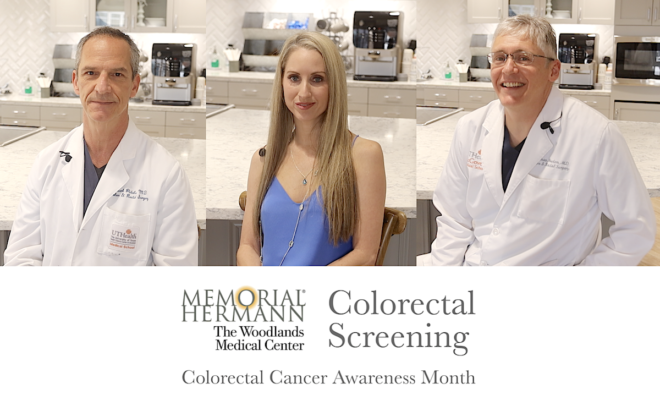
Health
Colorectal Cancer Screening at Memorial Hermann The Woodlands Medical Center
In honor of National Colorectal Cancer Awareness Month, we interview colon and rectal surgeons Dr. Mark Pidala and Dr. Thomas Newton of McGovern Medical School at UTHealth and Memorial Hermann The Woodlands Medical Center and patient Jill Schwertner, who share the importance of colorectal cancer screening, like a colonoscopy.
Watch the video interview below:
Dr. Thomas Newton shared that colorectal cancer is the second most common cause of cancer death in the United States when men and women are combined. However, regular screening can find colorectal cancer when it is small, hasn’t spread, and might be easier to treat. Some types of screening, like a colonoscopy, can also help find and remove pre-cancerous growths called polyps before they have a chance to turn into cancer.
The American Cancer Society’s guidelines for colorectal cancer screening and recommends people at average risk for colorectal cancer begin screening at age 45. In the most recent guideline update, ACS lowered the age to start screening because studies show rates of colorectal cancer among people younger than 50 are on the rise. ACS experts have determined that screening starting at 45 could help save more lives.
What is a Colonoscopy?
A colonoscopy is a visual procedure that looks inside the rectum and colon for polyps, abnormal areas, or cancer. A colonoscope (a thin, lighted tube) is inserted through the rectum into the colon. Polyps or tissue samples may be taken for biopsy. You will receive sedation, and are not awake, during this procedure.
Why it’s Recommended?
The purpose of a colonoscopy is trifold – diagnostic, preventative and interventional. A colonoscopy gets to the bottom of troublesome gastrointestinal symptoms, screens for diseases of the colon and removes precancerous lesions. If necessary, small biopsies may be taken and sent to pathology. These procedures:
- Screen for colon cancer
- Investigate causes of intestinal problems, such as pain, bleeding, chronic diarrhea and/or constipation
- Look for and remove polyps
Learn more why early detection is key, when to talk to a doctor, and schedule a colonoscopy at https://www.memorialhermann.org/services/colonoscopy
Special thank you to Memorial Hermann The Woodlands Medical Center for allowing Hello Woodlands to film the video interview at Canopy Cancer Survivorship Center located at Medical Plaza 1, 1120 Medical Plaza Dr #250, The Woodlands, TX 77380.
























